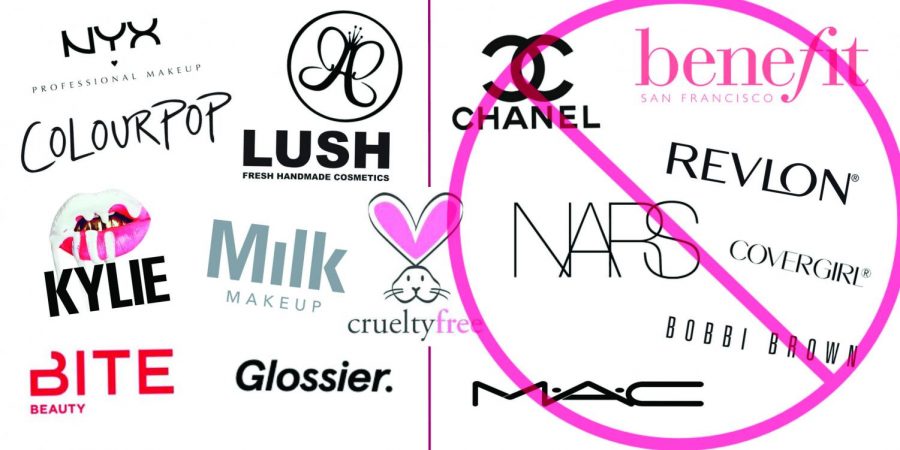California Takes Aim At ‘Cruelty’
Bill 1249 may eliminate cosmetic sales with a history of animal testing
A few mega brands pictured above feature those that test cosmetics on animals versus those that do not.
Getting beauty companies to convert into cruelty free businesses has been an ongoing issue for consumers, but things have shifted in the last decade with more products available that don’t test on animals.
However, on Sept. 4, the California State Assembly unanimously passed Senate Bill 1249, which, if signed into law by Gov. Jerry Brown, will eliminate California sales of any beauty products that have been tested on animals.
What does this mean for the state? Beauty brands such as NARS, Benefit, Clinique, Covergirl and Maybelline could find themselves incapable of selling their products in California. In addition, this new law will take a stance against products ranging from deodorants to shampoos and conditioners that also test on animals.
Brands in the beauty industry such as Fenty Beauty, Glossier, Anastasia Beverly Hills, and Kylie Cosmetics avoid the method of animal testing entirely. Lush Cosmetics has continuously worked to reform, reduce and eliminate animal testing altogether. Furthermore, Lush has their own unique policy called the “Supplier Specific Boycott,” which states that they will not purchase ingredients from manufacturers that test anything involving animals.
The U.S. beauty and personal care market is worth at least $86 billion, as of 2017. Internationally, the figure is $445 billion, according to Statista and Forbes, respectively.
As beauty and cosmetics enter Chinese markets, rules change, as Chinese law requires mandatory animal testing on cosmetics that are manufactured outside of their country.
Laboratories test these cosmetic ingredients on animals which can irritate both their skin and eyes. “Currently, nine out of 10 experimental drugs fail in clinical studies because we cannot accurately predict how they will behave in people based on laboratory and animal studies,” former secretary of the U.S Department of Health and Human Services Michael O’Leavitt said. That point is crucial because it’s a reminder that cosmetic animal testing may not be beneficial to human beings at all.
One organization that has belabored this point is the People for the Ethical Treatment of Animals, or PETA. They are dedicated to protecting what they deem to be animal rights at all costs by educating the public on certain topics, concluding new research to implement new changes, and curating their own protest campaigns.
One way that the cosmetic industry can avoid pitfalls if a law like SB 1249 is passed is for manufactures and suppliers to implement a truly cruelty free market where all brands can prosper without it being at an animals’ expense.
Alternative methods do exist that involve testing on humans instead of animals. This modern new form of testing is known as Vitro Testing and involves a human based microdosing. In turn, this practice has become more reliable, accurate, and cheaper — not to mention no animals are involved to begin with.
If indeed this law is passed by Gov. Jerry Brown, it will go into effect on Jan. 1, 2020 and reshape the beauty industry with regard to animal cruelty.
As we have seen before, what starts in California normally spreads out. So, if the law does pass, it’s entirely possible other states will follow California’s lead.

Born and raised in sunny Los Angeles California, Kylie Shannon plans to earn a degree in Public Relations, Journalism. She is currently on her 3rd year...

